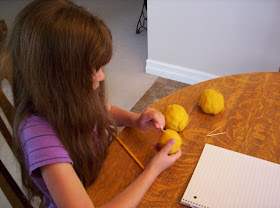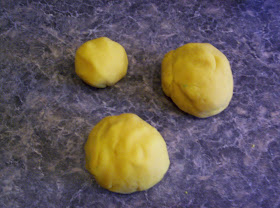
 Our boredom buster for the afternoon came from Janice Vancleave's Chemistry for Every Kid: 101 Easy Experiments that Really Work, and is actually a lesson in deductive reasoning.
Our boredom buster for the afternoon came from Janice Vancleave's Chemistry for Every Kid: 101 Easy Experiments that Really Work, and is actually a lesson in deductive reasoning.In case you've been wondering what's up with all of the science books I've been referencing, lately - I'm hoping to eventually work through enough of them, with the children, that we can put together a top 10 list of the those we recommend. We still have quite a few books, at our library alone, to work through, so I'm not sure if this book will make the cut, or not, but I can pretty well guarantee, that something by Janice Vancleave will be there.
As to this project, I took a random assortment of the children's toys, and hid them in play dough balls.


 I gave the balls to the children, with a notebook, pencil, and some toothpicks. Their instructions were to try to determine what sort of toy was hidden in each ball, by poking into the play dough with the toothpicks.
I gave the balls to the children, with a notebook, pencil, and some toothpicks. Their instructions were to try to determine what sort of toy was hidden in each ball, by poking into the play dough with the toothpicks.They were not to squeeze the play dough, or peek into the holes made by the toothpicks.
Then, when they thought they knew what the toy was, they were to draw it in their notebook.
Finally, after they had drawn what they thought was in the dough, we pulled it out for comparison.

This being their first time at the activity, they failed terribly. But, it gave them a good lesson in what scientists have to go through when trying to identify something they cannot see, or hold directly. And, it was a good lesson, as well, in the dangers of listening to the crowd.
 When one of them thought there was a dinosaur in the dough, they all decided there was a dinosaur in the dough. Then, after they saw what one of the toys was, they decided all the toys were that same thing. They were going with what they believed, instead of what the evidence presented.
When one of them thought there was a dinosaur in the dough, they all decided there was a dinosaur in the dough. Then, after they saw what one of the toys was, they decided all the toys were that same thing. They were going with what they believed, instead of what the evidence presented.For younger children, I would suggest showing them the toys ahead of time, and then letting them determine which toy is in which glob of dough.
And, of course, you should be prepared for some independent play dough time, once all the objects have been revealed.

It's great to be a homeschooler.
I think I've almost commented her about 10 times. Sigh, stupid distractability.
ReplyDeleteAnd yes that is a word, I'm sure.
I love this idea for teaching about observation, I just need to have enough play-doh that isn't dried up to make this work.
Looks like it was a fun way to learn! Always on the lookout for that...Thanks for sharing!
ReplyDelete-Ashley
This looks like fun! We have to try it when friends come over to see if they jump on the band wagon too. Lol.
ReplyDeleteWe did something like this where I hid an object inside a box and JC had to guess what it is by moving the box around. Back then, she was a little too eager to open the boxes so we might try that again now that she's older.
We also have a few science project books but do not know if they are any good. You reminded me to get started using them to find out - a science project of its own.
How cool. As I was reading (before I got to the point where you mentioned showing younger children the toys first) I thought that I would do that with my kids and then let them deduce which toy was in the play dough. Fun!
ReplyDeleteWhat a great idea! We might try this tomorrow. I have lots of play do and it is too hot to be outside. :-)
ReplyDeleteGreat! Thank you. We'll be doing this before the summer is out.
ReplyDeleteWe have done two things that are similar to this. First we did things in a box, and then we showed them fruits and vegetables they were not very familiar with and asked them what they thought the inside might look like from what the outside looked like and then we cut them open for them to see how accurate their guesses were.
ReplyDeletehttp://homeschooljournal-bergblog.blogspot.com/2009/11/what-is-it-exercise-in-making.html
I think I will add this one to these activites. It would be great for the older kids.
-Phyllis
Love it! What an awesome idea. I am definitely going to try it here, but I am not so sure that daughter will refrain from picking.
ReplyDelete